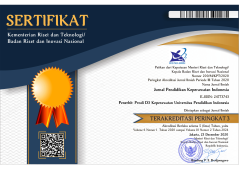The Correlation between Spiritual Care Giving and Nurses’ Competences at Critical Care Units
Abstract
ABSTRACT
Patients’ complex and critical conditions may influence humans to fulfill their basic daily needs. One nurses’ main task is giving the nursing care based on the patients’ daily needs including spiritual care. However, the critical care nurses only focused on the patients’ physical needs, without paying more attentions to the spiritual care. Many factors may influence the nurses’ competences in giving the spiritual care, including nurses’ perceptions, involvements with the other health workers, spiritual care input as a part of nursing curriculum. Thus, it is greatly important to r reveal the correlation between spiritual care giving and nurses’ competences in developing the spiritual care to the patients. This study aims at revealing the correlation between spiritual care giving and nurses’’ competences at critical care units. This quantitative non experimental research employed a cross sectional design. Seventy seven critical care nurses at the intensive care units participated in this research and two research instruments consisting of Spiritual Care Giving Scale (SCGS) and Spiritual Care Competence Scale (SCCS) were employed. The data were then bivariately analyzed to reveal the nurses’ perceptions on spiritual care. The research results showed that spiritual care giving and nurses’ competences had a strong correlation. Each domain in spiritual care giving scale had a strong correlation with nurses’ competences.
ABSTRAK
Kondisi pasien kritis yang komplek dapat menganggu terpenuhinya kebutuhan dasar manusia. Fokus perawat dalam merawat pasien adalah dengan memberikan asuhan keperawatan yang berdasar pada kebutuhan dasar manusia dimana salah satu kebutuhan dasar manusia yang juga harus dipenuhi adalah kebutuhan spiritual. Namun, kenyataannya perawat dalam memberikan perawatan kepada pasien hanya berfokus kepada perawatan medis dan fisik saja, tanpa melakukan pendekatan secara spiritual. Beberapa faktor dapat mempengaruhi kompetensi perawat dalam memenuhi kebutuhan spiritual pasien seperti persepsi perawat, keterlibatan dengan multidisiplin lain, melibatkan materi spiritual dalam kurikulum keperawatan. Berdasarkan paparan di atas, maka penting untuk dilakukan kajian mengenai hubungan kompetensi perawat dengan pemberian perawatan spiritual. Jika hal tersebut sudah dapat diketahui, maka ruangan intensif akan lebih mudah dalam mengembangkan bentuk pemberian kebutuhan spiritual pada pasien. Penelitian ini bertujuan untuk mengetahui hubungan antara kompetensi perawat dan pemberian perawatan spiritual pada perawat kritis. Jenis penelitian yang digunakan adalah penelitian kuantitatif korelasi dengan desain penelitian cross sectional. Responden pada penelitian ini adalah perawat yang bekerja di Unit Rawat Intensif sebanyak 78 orang. Instrumen penelitian yang digunakan adalah Spiritual Care Giving Scale (SCGS) dan Spiritual Care Competence Scale (SCCS). Pada penelitian ini, data dianalisis secara bivariat untuk mengetahui hubungan kompetensi perawat dan pemberian perawatan spiritual. Secara umum, pemberian perawatan spiritual mempunyai hubungan yang kuat dengan kompetensi perawat (r=0.619) dimana setiap domain dalam Spiritual Care Giving Scale (SCGS) mempunyai hubungan yang kuat (p value< 0.00) dengan kompetensi perawat dalam memberikan perawatan spiritual. Hasil analisa tersebut dapat disimpulkan bahwa kompetensi perawat tentang perawatan spiritual dapat mempengaruhi bagaimana pemberian perawatan spiritual kepada pasien. Penelitian selanjutnya diharapkan dapat melakukan intervensi berupa pelatihan pemberian perawatan spiritual untuk perawat agar dapat diaplikasikan di rumah sakit.
Keywords
Full Text:
PDFReferences
Abuatiq, A. (2015). Spiritual Care for Critical Care Patients. International Journal of Nursing & Clinical Practices, 2(1), 2–5. https://doi.org/10.15344/2394-4978/2015/128
Anisa, N. R., Erika, K. A., & Rachmawaty, R. (2018). Nurse’s Spiritual Care Competencies to Patient with End Stage Breast Cancer. International Journal of Public Health Science (IJPHS), 7(4), 268. https://doi.org/10.11591/ijphs.v7i4.14742
Azarsa, T., Davoodi, A., Khorami Markani, A., Gahramanian, A., & Vargaeei, A. (2015). Spiritual wellbeing, Attitude toward Spiritual Care and its Relationship with Spiritual Care Competence among Critical Care Nurses. Journal of Caring Sciences, 4(4), 309–320. https://doi.org/10.15171/jcs.2015.031
Baird, Pamela. (2016). Spiritual care intervention in Spiritual, Religious, and Cultural Aspects of Care. Oxford: Oxford University Press, pp. 29–45.
Carr, D. (2018). Spirituality, spiritual sensibility and human growth. International Journal for Philosophy of Religion, 83(3), 245–260. https://doi.org/10.1007/s11153-017-9638-x
Chan, M. F. (2010). Factors affecting nursing staff in practising spiritual care. Journal of Clinical Nursing, 19(15–16), 2128–2136. https://doi.org/10.1111/j.1365-2702.2008.02690.x
Choi, P. J., Curlin, F. A., & Cox, C. E. (2015). “The Patient Is Dying, Please Call the Chaplain”: The Activities of Chaplains in One Medical Center’s Intensive Care Units. Journal of Pain and Symptom Management, 50(4), 501–506. https://doi.org/10.1016/j.jpainsymman.2015.05.003
Hamid N, Dehghanizadeh Z. (2015). The relationship between spirituality, Predictors of spiritual care competence among nurses Journal of Caring Sciences, December 2015; 4 (4), 309-320|319
Kalish, N. (2012). Evidence-based spiritual care: A literature review. Current Opinion in Supportive and Palliative Care, 6(2), 242–246. https://doi.org/10.1097/SPC.0b013e328353811c
Melhem, G. A. B., Zeilani, R. S., Zaqqout, O. Abed., Aljwad, A. I., Shawagfeh, M. Q., & Al- Rahim, M. A. (2016). Nurses’ Perceptions of Spirituality and Spiritual Care Giving: A Comparison Study Among All Health Care Sectors in Jordan. Indian Journal of Palliative Care, 22(1), 42–49. https://doi.org/10.4103/0973-1075.173949
Ozbasaran, F., Ergul, S., Temel, A. B., Aslan, G. G., & Coban, A. (2011). Turkish nurses’ perceptions of spirituality and spiritual care. Journal of Clinical Nursing, 20(21–22), 3102–3110. https://doi.org/10.1111/j.1365-2702.2011.03778.x
Purwatisari. (2015). Gambaran Persepsi Perawat Mengenai Kebutuhan Spiritual dan Pemenuhan Kebutuhan Spiritual Pasien Kanker di RSUD Tugurejo Semarang. Universitas Diponegoro. (cited on November 23, 2020), retrieved from https://eprints.undip.ac.id
Ramezani, M., Ahmadi, F., Mohammadi, E., & Kazemnejad, A. (2014). Spiritual care in nursing: A concept analysis. International Nursing Review, 61(2), 211–219. https://doi.org/10.1111/inr.12099
Royal College of Nursing. (2011). RCN Spirituality Survey 2010. London: Royal College of Nursing
Sary, Selly Puspita. (2018). Hubungan Kecerdasan Spiritual Perawat dengan Pemenuhan Kebutuhan Spiritual Pasien. (cited on November 23, 2020) retrieved from http://repository.unej.ac.id/handle/123456789/87350
Sianturi, N. J. (2015). Persepsi Perawat dan Manajer Perawat tentang Spiritual Care di RSUD Dr R.M. Djoelham Binjai. http://repository.usu.ac.id/handle/123456789/44553
Visser, A., Garssen, B., & Vingerhoets, A. (2010). Spirituality and well-being in cancer patients: A review. Psycho-Oncology, 19(6), 565–572. https://doi.org/10.1002/pon.1626
Willemse, S., Smeets, W., van Leeuwen, E., Nielen-Rosier, T., Janssen, L., & Foudraine, N. (2020). Spiritual care in the intensive care unit: An integrative literature research. Journal of Critical Care, 57, 55–78. https://doi.org/10.1016/j.jcrc.2020.01.026
Yang, R. (2016). Dependency in Critically Ill Patients: A Meta-Synthesis. Global Qualitative Nursing Research, 3, 233339361663167. https://doi.org/10.1177/23333936166316778
DOI: https://doi.org/10.17509/jpki.v6i2.27057
Refbacks
Jurnal Pendidikan Keperawatan Indonesia(JPKI) published by Indonesia University of Education. JPKI is licensed under a Creative Commons Attribution-ShareAlike 4.0 International License.
Office :
Nursing Department. FPOK UPI.
229, Dr. Setiabudhi Street. Bandung 40154
West Java , Indonesia
E-mail : jpki@upi.edu

_.png)
_.png)
_.png)











